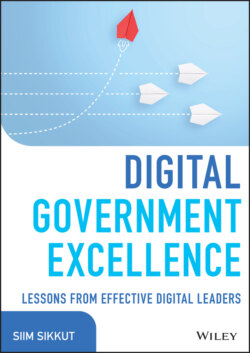Читать книгу Digital Government Excellence - Siim Sikkut - Страница 55
I Know That You Also Made a Big Push for the Team to Work in the Open. How Did That Work?
ОглавлениеWe would have our GCIO office all-staffs quarterly and have them mandatory. We also started recording these meetings, because we were the policy center, and I wanted the operational departments to know what we were talking about. We would livestream the meeting or just send the record out to all other departments. The direction setting to me is always about open and transparent communications, plus letting people challenge the direction.
With my own team, we would also do periodical “ask me anything” hours so that people could air out some of the issues there.
Openness and transparency are huge because they mean that we are also forced to deliver. Enabling the staff members to talk themselves about their projects and their programs was a small thing that turned into a big deal. They made themselves accountable by talking about their work online. The effect of open-by-default working on self-discipline at the staff level became apparent through the work we were doing.
We also very openly sang praises about the successes, including to other departments, which had done a great digital project. We started using for it the online platforms we had created for ourselves. That was a way to publicly show the change that was going on, and it became a carrot on its own to other departments and our own team, frankly.
In an era of global digital collaboration, it does not really compute if public servants are anonymous and hide behind their desks. Governments need to be way more transparent, open-by-default on everything they do as long as it is not a national security matter. Why are policies developed behind closed doors? Why cannot every Canadian citizen whom the government serves have access to the draft of the policy before it is signed off and comment on it? The world would be a better place if governments went even a bit further down the road of being open and transparent and collaborative. It is better for the economy and better for the democracy if people participate. That is why we started doing all in the open.
My open-door policy worked great in other ways, too. There are twenty to twenty-five thousand people in GC. I basically said to them, “If you have a great idea, contact me,” and some did. Most people did not because they thought you cannot talk to a deputy minister if you are a technician. Yet, this is where the good ideas usually come from. They are not going to come from me. A great example is our Talent Cloud, which had the aim of bringing a “gig economy” approach to allow GC to hire short-term employment more easily and faster. There was a person with a vision on how to do it; she only needed some air cover and support. She came to me with the idea, we brought her in, and she got it done. Others had called her crazy before for what she wanted to do and how bold her vision was.
